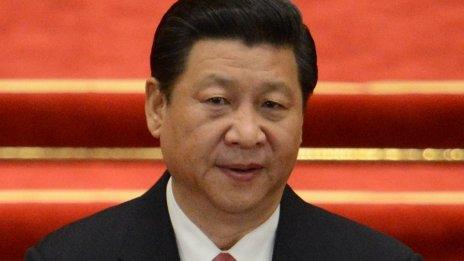China media: Xi's Chinese New Year greetings
- Published

President Xi Jinping's Chinese New Year greetings to non-communist parties, Japanese PM Shinzo Abe's latest criticism of China and "super-national treatment" of civil servants are making headlines on Thursday.
State-owned media have given front-page coverage to Mr Xi's festive greetings to non-communist parties ahead of the Spring Festival, or Chinese New Year, on 31 January.
Mr Xi said the Communist Party of China (CPC) "firmly relying on the people, including non-communist members, defeated various challenges and difficulties in the last year and achieved outstanding results".
He hoped "that all the non-communist members" can cooperate with the CPC to "make further contributions this year", according to Xinhua news agency.
In regional news, media in China are criticising Mr Abe for reportedly comparing China-Japan relations with pre-war UK-Germany ties in his latest statement.
Coming to Mr Abe's defence, Japan's Chief Cabinet Secretary Yoshihide Suga said that the PM was not painting a war scenario with China, the China News Service reports.
The assurance, however, does not seem to pacify Mr Abe's critics and instead has drawn sharp criticism from China's Foreign Ministry, asking Mr Abe to reflect on the Sino-Japanese war in 1894.
The People's Daily, in a series of articles, says Japan is "making matters worse with the denial" of Mr Abe's statement.
One article describes Mr Abe's explanation of his visits to the controversial Yasukuni Shrine as "ridiculous", while another warns that Japan's "stubbornness is bringing danger to the world".
In an equally sarcastic tone, the China Daily says Mr Abe has changed his stance on ties with China several times and that "trusting him may prove a mistake too costly to be affordable".
The bun song
In domestic news, media are also discussing the "super-national treatment" given to civil servants, with netizens calling entitlements for government officials to be scrapped.
Web portal NetEase lists the welfare benefits civil servants currently receive, including "above-average salary", "cheap housing", "free healthcare" and other "perks" including having a "low-stress job" and the opportunities to gain "grey income", which refers to unrecorded earnings.
However, the China Youth Daily says the current government has taken steps to curb civil servants' expenditure.
Though there seem to be great benefits of working in the government, the situation "has changed in 2013", as President Xi Jinping rolled out austerity measures last year such banning expensive meals and receiving gifts, it says.
Some civil servants have even lamented that "life is more difficult now", but Xu Yaotong from Chinese Academy of Governance tells the paper that "civil servants should not be getting so many benefits in the first place".
The paper also suggests that the civil service is overstaffed.
Joining the debate, the Global Times says the discussion on "super-national treatment" is "emotional" and will "intensify tensions".
"This is an illegitimate and lazy depiction of the welfare benefits Chinese civil servants get. Except for a handful of corrupt officials, these benefits need to be evaluated on the facts," the paper says.
Meanwhile, China's broadcasting watchdog has asked TV stations to produce more original cultural programmes that promote the "China dream", reports Xinhua news agency.
"Broadcast media need to conscientiously shoulder the social responsibility to promote and pass on traditional culture… insist on the right direction, highlight theme on 'China Dream'…" the agency quotes the State Administration of Press, Publication, Radio, Film and Television as saying.
And finally, music composer Wu Songjin and lyricist Zou Dangrong have penned a song entitled "Steamed Bun Store" after President Xi Jinping recently queued up for his steamed bun lunch at a dumpling shop in Beijing.
It has been reported that several singers are eager to sing the song, including Gong Linna, who will be performing at the Spring Festival Gala on the eve of the Chinese New Year.
However, Gong later clarified things on Weibo, China's microblog, rejecting such news as rumours, the China News Service reports.
"I am not singing anything about buns and dumplings this new year," she quips.
BBC Monitoring reports and analyses news from TV, radio, web and print media around the world. For more reports from BBC Monitoring, click here. You can follow BBC Monitoring on Twitter and Facebook.